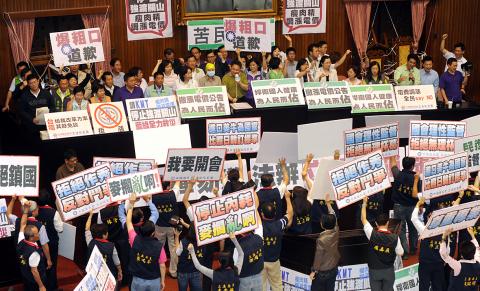Citizen’s Congress Watch (CCW) yesterday said President Ma Ying-jeou (馬英九) — who doubles as Chinese Nationalist Party (KMT) chairman — was responsible for the paralysis in the Legislative Yuan, urging the ruling party to put aside the controversial beef amendment to allow other bills to be reviewed.
Since Monday, Democratic Progressive Party (DPP) and Taiwan Solidarity Union legislators have filibustered the legislative session in a bid to prevent the KMT from passing amendments to the Act Governing Food Sanitation (食品衛生管理法) that would allow US beef containing residues of the leanness enhancing livestock feed additive ractopamine into Taiwan.
While KMT lawmakers have condemned the opposition parties for stalling the legislature, CCW said it was the KMT — more specifically Ma — who should be held responsible.

Photo: Lo Pei-der, Taipei Times
“Since the beginning of the legislative session [in February], only 11 bills have been passed, making this session one of the least productive in Taiwan’s history,” CCW executive director Chang Hung-lin (張宏林) told a news conference. “One of the reasons is that Ma is trying to push through too many controversial bills — such as increasing utility prices and lifting the ban on US beef imports [with ractopamine residues] — after winning his re-election to the presidency in January.”
He said that according to opinion polls, as many as 60 percent of the public are worried about the health threat that ractopamine poses, and some KMT lawmakers have also expressed such worries, though they have been ordered by Ma to support the relaxation of the ban in the legislature.
“The regular session ends [yesterday], but there may be provisional legislative sessions,” Chang said. “The CCW urges lawmakers to put aside controversial bills, and look at other bills first in the extraordinary session.”
On the KMT’s criticism that the DPP is wasting taxpayers’ money by stalling the bills, Chang said that filibustering legislative meetings is a way to protest controversial issues when the ruling party holds a majority.
“Filibustering is a tactic practiced in many other countries. I don’t think it’s inappropriate unless violent means are used,” Chang said.
President Ma Ying-jeou’s (馬英九) administration has been pushing the bill on the grounds that allowing the imports is key to resuming important trade talks with the US and ensuring that Taiwan remains competitive.
Because some KMT lawmakers are calling on the government to relax the ban on ractopamine through an executive order, the Homemakers’ United Foundation secretary-general Lu Mei-luan (呂美鸞) reminded the government to follow the proper procedure stipulated in the Executive Procedures Act (行政程序法).
“An executive order is not something that the executive branch of the government can produce whenever it likes,” she said.
“According to the law, there is a procedure to follow, the government should explain to the public why and what it wants to achieve through the executive order, and organize public hearings so that people can express different opinions,” she said.

Aftershocks from a magnitude 6.2 earthquake that struck off Yilan County at 3:45pm yesterday could reach a magnitude of 5 to 5.5, the Central Weather Administration (CWA) said. Seismological Center technical officer Chiu Chun-ta (邱俊達) told a news conference that the epicenter of the temblor was more than 100km from Taiwan. Although predicted to measure between magnitude 5 and 5.5, the aftershocks would reach an intensity of 1 on Taiwan’s 7-tier scale, which gauges the actual effect of an earthquake, he said. The earthquake lasted longer in Taipei because the city is in a basin, he said. The quake’s epicenter was about 128.9km east-southeast

GENSLER SURVEY: ‘Economic infrastructure is not enough. A city needs to inspire pride, offer moments of joy and foster a sense of belonging,’ the company said Taipei was named the city with the “highest staying power” in the world by US-based design and architecture firm Gensler. The Taiwanese capital earned the top spot among 65 cities across six continents with 64 percent of Taipei respondents in a survey of 33,000 people saying they wanted to stay in the city. Rounding out the top five were Vietnam’s Ho Chi Minh City (61 percent), Singapore (59 percent), Sydney (58 percent) and Berlin (51 percent). Sixth to 10th place went to Monterrey, Mexico; Munich, Germany; Sao Paulo, Brazil; Vancouver; and Seoul. Cities in the US were ranked separately, with Minneapolis first at

The New Taipei City Government today warned about the often-overlooked dangers of playing in water, and recommended safe swimming destinations to cool off from the summer heat. The following locations in the city as safe and fun for those looking to enjoy the water: Chienshuiwan (淺水灣), Baishawan (白沙灣), Jhongjiao Bay (中角灣), Fulong Beach Resort (福隆海水浴場) and Sansia District’s (三峽) Dabao River (大豹溪), New Taipei City Tourism and Travel Department Director-General Yang Tsung-min (楊宗珉) said. Outdoor bodies of water have variables outside of human control, such as changing currents, differing elevations and environmental hazards, all of which can lead to accidents, Yang said. Sudden

Tropical Storm Podul has formed over waters north-northeast of Guam and is expected to approach the seas southeast of Taiwan next week, the Central Weather Administration (CWA) said today. The 11th Pacific storm of the year developed at 2am over waters about 2,660km east of Oluanpi (歐鑾鼻), Pingtung County — Taiwan's southernmost tip. It is projected to move westward and could have its most significant impact on Taiwan on Wednesday and Thursday next week, the CWA said. The agency did not rule out the possibility of issuing a sea warning at that time. According to the CWA's latest update, Podul is drifting west-northwest